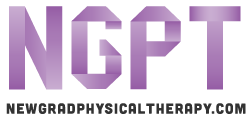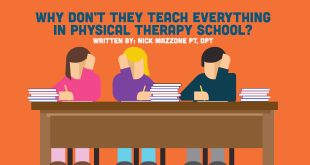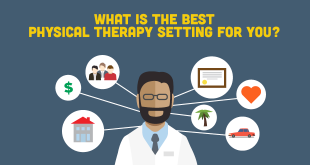Physical therapy school is busy enough as it is. Trying to find time between classes, observations, affiliations, research projects, class events, and personal development makes me wish I could somehow create an additional day on the weekend just to keep up! With so much on our plates already, it hardly seems enjoyable or even practical to take additional classes on the side. Besides, why would you take continuing education when you aren’t even done with school yet? Continuing education shouldn’t be thought of as just more information to cram in; there is plenty of material in school to study, as is.
Focused learning
I love learning about physical therapy, and if you are reading this article, I imagine you do too. But what if the structured curriculum offered by physical therapy school leaves you wishing you learned more about a particular topic?
There are pros and cons of each, so an easy heuristic is to take one of each per semester. If this sounds overwhelming, try for one of each per year. For example, if you are interested in getting in some extra preparation for your next orthopedic affiliation, you could take a manual therapy course, a targeted webinar on shoulders, and study the CSCS textbook. This option gives you direct hands on time with experts at a course, the option to re-watch sections of a webinar in the comfort of your own home, while the textbook offers information in an amount that would be impossible to deliver through another medium.
Opportunities to network
Continuing education courses (that you physically attend) also offer the unique chance to meet and connect with other students and practicing therapists. It’s an opportunity that school can rarely provide. Why prioritize networking? Almost every opportunity I have been offered, from book appearances to research jobs, has been because I make an effort to meet and connect with new people. You never know which opportunities will reveal themselves until you reach out and meet new people.
Another benefit from taking courses with practicing therapists is the ability to develop an informal mentor relationship. This point was impressed upon me early on after reading Mastery, one of my favorite books by Robert Greene. Mentors are able to provide insight when you have questions, guidance when you feel lost, and correction before you make the same mistakes they once made. How do you develop a mentorship? It’s often not formal, and simply asking a therapist you met at a course for help on a topic and developing rapport goes a long way. You would be surprised how many people would be happy to help.
Make yourself more marketable
During a recent conversation with one of my master clinicians, he mentioned one of his co-workers who, despite being a new grad, was recently hired at a prestigious hospital and placed in a setting of his choice because of all the continuing education he sought out while still in school. Was this the only factor contributing to his success? Of course not, but it gave him a bump over other applicants because it demonstrated that he was willing to go above and beyond expectations. This is something employers certainly look for when searching for employees.

Should we really be worrying about making ourselves more marketable this early? Absolutely! No matter what year you are currently in, physical therapy school will be over before you know it (I certainly feel like it’s flying by), and if there is a spot you are looking to work at after graduation, you better believe others are eyeing it as well. Of course, continuing education isn’t going to guarantee you anything, but it certainly helps.
Continuing education offers many unique benefits to students that school simply cannot provide. But this is not your PT school’s responsibility, after all. This is up to us, the students, to seek out opportunities. To close, here is one of my favorite quotes on self development and continuing education from Brian Tracy:
Are there any sources to back this up? No, not necessarily, but don’t take it in its most literal sense. Instead, look for themes. Continuing education is about self development. Acquiring knowledge, finding opportunities through networking, and making yourself more marketable will go a long way in your professional life, and continuing education courses are a great way to accomplish all three.
 NewGradPhysicalTherapy.com The Largest Online Resource For New Grad Physical Therapists
NewGradPhysicalTherapy.com The Largest Online Resource For New Grad Physical Therapists







